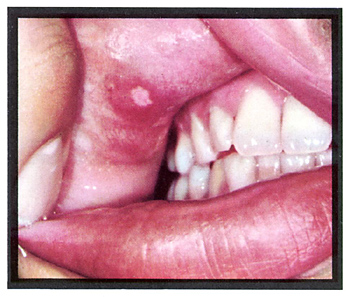How to Get Rid of Cold Sores
No one is thrilled about getting a cold sore. Besides being embarrassing and unsightly, cold sores are also itchy and painful. Once an outbreak occurs, the next step is to try to quell the virus.
There are a number of ways to keep cold sores from spreading. You should know the symptoms of a cold sore and how to keep the virus contained. Here’s how to get rid of cold sores.
12 Treatments of Cold Sores
- Make sure your cold sores are not canker sores. Cold sores are confused with canker sores, which look different. This may seem obvious, but treatments that are effective in eradicating canker sores won’t work in banishing cold sores. Cold sores are red blisters on the nose or mouth that are filled with pus. Canker sores are tiny white bacterial infections that are located inside of the mouth.
- Make sure your cold sores are cold sores. Mistaken identity sometimes occurs when cold sores are in their first stage. Cold sores may cause tightening of the skin, itching, and burning. In later stages, cold sores become larger and numerous, while filling with fluid.
- Don’t touch the cold sores. Once you are sure you have a cold sore, try not to scratch it, even if it seems like the itch is unbearable. Physical contact is the cold sore’s mode of transportation. Scratching or rubbing the bumps will only serve to infect another person, if not other parts of your face, with the virus.
- Use a clean washcloth and hot water with antibacterial soap to clean a cold sore. Since touching a cold sore can spread the virus to other parts of your face, use a washcloth soaked with hot water in conjunction with antibacterial soap to clean the blisters. Hot water and antibacterial soap will get rid of pus and minimize the infection. Gently scrub the cold sores and the area around them without getting vigorous, as this may encourage infection.
- Use a product containing petroleum to heal cold sores. A petroleum-based product (Vaseline, for instance) will prevent the herpes virus from becoming more infected, minimize its itch, and seal the virus in. Wash your hands with hot water and antibacterial soap before and after touching the sore. Apply the product outward to inward on the cold sore and its surrounding area so that the virus will not spread.
- Use over-the-counter antibiotics and painkillers. Neosporin is an antibiotic that helps heal cold sores. Ibuprofen, acetaminophen, and aspirin are painkillers that help stop cold sores from hurting. They also prevent you from rubbing the sores and spreading infection.

How to Get Rid of Cold Sores
- Use over-the-counter anesthetics. Products containing benzocaine can assist in numbing the pain. They are cheap and do not require a prescription. When cold sores are numbed by anesthetics, you will not have the urge to touch them and spread the virus.
- Cover the cold sores with oil. Apply garlic oil or oregano oil to the cold sores to keep them oiled. Cold sore scabs crack and re-heal, lengthening the life of the virus. Garlic and oregano oil are anti-viral agents that keep the scab soft.
- Take care of your body. Get sleep, eat nutritious foods, and take protein supplements. If you fail to take care of your body, cold sores will persist. The amino acid Lysine fights the herpes virus, as does Vitamin B.
- After fourteen days, seek medical attention. Go to a doctor if your cold sores last for fourteen days or longer. A cold sore should not last more than one to two weeks. A professional will prescribe prescription antiviral medication, (Denivar, Zovirax, Famvir, Valtrex, etc.).
- Be aware of any cold sore triggers so that you can avoid them. Take note of triggers when you have an outbreak and try to avoid them. There are a variety of triggers, including health problems (like a cold or the flu). Triggers also include menstruation, anxiety, stress, and salty or acidic foods (like citrus or potato chips).
- Avoid exposure to extreme weather conditions. Apply sunscreen in hot weather and avoid freezing wind. If you can’t avoid certain triggers, try to anticipate a cold sore outbreak. When you know you have been exposed to triggers, begin taking medication to shorten the life of the virus.
Cold sores are undesirable, but their lifespan can be shortened. Use knowledge of cold sore symptoms to identify them. Do not touch cold sores unless you are applying a petroleum-based product or washing them with antibacterial soap.
Avoid cold sore triggers and preempt outbreaks by taking medication when you suspect the beginning of a cold sore. If the virus lasts for fourteen days, seek prescription-strength antiviral medication. By following these steps, you can get rid of cold sores and keep them from coming back.
